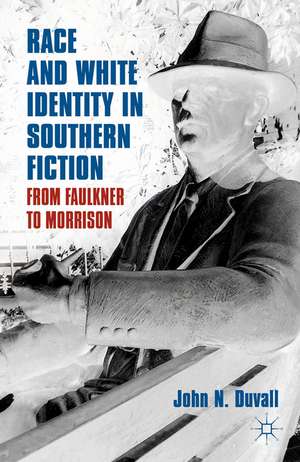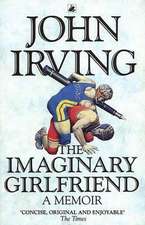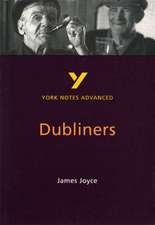Race and White Identity in Southern Fiction: From Faulkner to Morrison
Autor J. Duvallen Limba Engleză Paperback – 24 iul 2012
| Toate formatele și edițiile | Preț | Express |
|---|---|---|
| Paperback (2) | 210.01 lei 6-8 săpt. | |
| Palgrave Macmillan US – 23 dec 2015 | 210.01 lei 6-8 săpt. | |
| Palgrave Macmillan US – 24 iul 2012 | 381.00 lei 6-8 săpt. | |
| Hardback (1) | 385.47 lei 6-8 săpt. | |
| Palgrave Macmillan US – iul 2008 | 385.47 lei 6-8 săpt. |
Preț: 381.00 lei
Nou
Puncte Express: 572
Preț estimativ în valută:
72.91€ • 79.17$ • 61.25£
72.91€ • 79.17$ • 61.25£
Carte tipărită la comandă
Livrare economică 22 aprilie-06 mai
Preluare comenzi: 021 569.72.76
Specificații
ISBN-13: 9780230340442
ISBN-10: 023034044X
Pagini: 194
Ilustrații: XIX, 194 p. 1 illus.
Dimensiuni: 140 x 216 x 13 mm
Greutate: 0.25 kg
Ediția:2008
Editura: Palgrave Macmillan US
Colecția Palgrave Macmillan
Locul publicării:New York, United States
ISBN-10: 023034044X
Pagini: 194
Ilustrații: XIX, 194 p. 1 illus.
Dimensiuni: 140 x 216 x 13 mm
Greutate: 0.25 kg
Ediția:2008
Editura: Palgrave Macmillan US
Colecția Palgrave Macmillan
Locul publicării:New York, United States
Cuprins
White Face, Black Culture Artificial Niggers, White Homelessness, and Diaspora Consciousness William Faulkner, Whiteface, and Black Identity Flannery O'Connor, (G)race, and Colored Identity John Barth, Blackface, and Invisible Identity Dorothy Allison, "Nigger Trash" and Miscegenated Identity African American Fiction and the Limits of Whiteface
Recenzii
"Duvall is renowned as a critic of William Faulkner and Toni Morrison, and these two writers inform the conceptual framework of Race and White Identity in Southern Fiction...[This is] an often provocative but always engaging book." - Journal of American Studies
"Duvall's readers, who have received good instruction in the uses of minstrelsy and white face (conscious and unconscious) in a variety of texts, will be on the lookout for the trope in other Southern writing. Those who teach about that writing will find that Duvall has strengthened their arsenal." - Joseph M. Flora, Mississippi Quarterly
"I applaud Duvall's careful positioning of his terms throughout his study and its apparatus and find that it opens a well-considered space for discussion of the relationships of whiteness, blackness, and their relative visible and cultural forms...Race and White Identity in Southern Fiction: From Faulkner to Morrison primes one for the possibility of more recombinatory work on race, race changes, and the dismantling of whiteness." - Contemporary Literature
"Duvall's study is an ambitious one, able to cover a great deal of conceptual ground with an admirable economy of expression...lucid and compelling, an essential volume for scholars of the American South, critical race theory, and twentieth-century literature." - South Atlantic Review
"Duvall positions his argument between queer and feminist performance studies, on the one hand, and critical race and whiteness studies, on the other...In treating race as a form of cultural performance enacted by authors and their novels, Duvall joins a group of scholars...who, at long last, are moving past the notion that race is, as Frantz Fanon famously put it, a factually 'epidermal schema.'" - Novel
"For some reason, the synergy between critical whiteness studies and southern literary studies has been slow to develop. That changes with Duvall's Race and White Identity in Southern Fiction. In a series of deftly written chapters ranging from Faulkner's self-caricature as a funny black man in New Orleans in the 1920s to contemporary dissections of whiteness by Toni Morrison, Dorothy Allison, and Ishmael Reed, Duvall charts the crises in representation and subjectivity that result when racially white southerners find themselves, often inadvertently, performing cultural blackness. This book would be indispensable if only for the highly original way in which it racializes the famous anagogical moment (or moment of grace) in the writings of Flannery O'Connor. But Duvall deserves extra credit for welcoming John Barth back into the canon of Southern writing, a canon from which Barth's credentials as a postmodernist have often seemed to exclude him. A very impressive study." - Jay Watson, Professor of English, University of Mississippi
"Duvall's readers, who have received good instruction in the uses of minstrelsy and white face (conscious and unconscious) in a variety of texts, will be on the lookout for the trope in other Southern writing. Those who teach about that writing will find that Duvall has strengthened their arsenal." - Joseph M. Flora, Mississippi Quarterly
"I applaud Duvall's careful positioning of his terms throughout his study and its apparatus and find that it opens a well-considered space for discussion of the relationships of whiteness, blackness, and their relative visible and cultural forms...Race and White Identity in Southern Fiction: From Faulkner to Morrison primes one for the possibility of more recombinatory work on race, race changes, and the dismantling of whiteness." - Contemporary Literature
"Duvall's study is an ambitious one, able to cover a great deal of conceptual ground with an admirable economy of expression...lucid and compelling, an essential volume for scholars of the American South, critical race theory, and twentieth-century literature." - South Atlantic Review
"Duvall positions his argument between queer and feminist performance studies, on the one hand, and critical race and whiteness studies, on the other...In treating race as a form of cultural performance enacted by authors and their novels, Duvall joins a group of scholars...who, at long last, are moving past the notion that race is, as Frantz Fanon famously put it, a factually 'epidermal schema.'" - Novel
"For some reason, the synergy between critical whiteness studies and southern literary studies has been slow to develop. That changes with Duvall's Race and White Identity in Southern Fiction. In a series of deftly written chapters ranging from Faulkner's self-caricature as a funny black man in New Orleans in the 1920s to contemporary dissections of whiteness by Toni Morrison, Dorothy Allison, and Ishmael Reed, Duvall charts the crises in representation and subjectivity that result when racially white southerners find themselves, often inadvertently, performing cultural blackness. This book would be indispensable if only for the highly original way in which it racializes the famous anagogical moment (or moment of grace) in the writings of Flannery O'Connor. But Duvall deserves extra credit for welcoming John Barth back into the canon of Southern writing, a canon from which Barth's credentials as a postmodernist have often seemed to exclude him. A very impressive study." - Jay Watson, Professor of English, University of Mississippi
Notă biografică
JOHN N. DUVALL is Professor of English at Purdue University, USA. He is author of Faulkner's Marginal Couple: Invisible Outlaw, and Unspeakable Communities, The Identifying Fictions of Toni Morrison: Modernist Authenticity and Postmodern Blackness, and editor or co-editor of Modern Fiction Studies, Productive Postmodernism: Consuming Histories and Cultural Studies, Faulkner and Postmodernism, Approaches to Teaching DeLillo's White Noise, and the Cambridge Companion to Don DeLillo.














